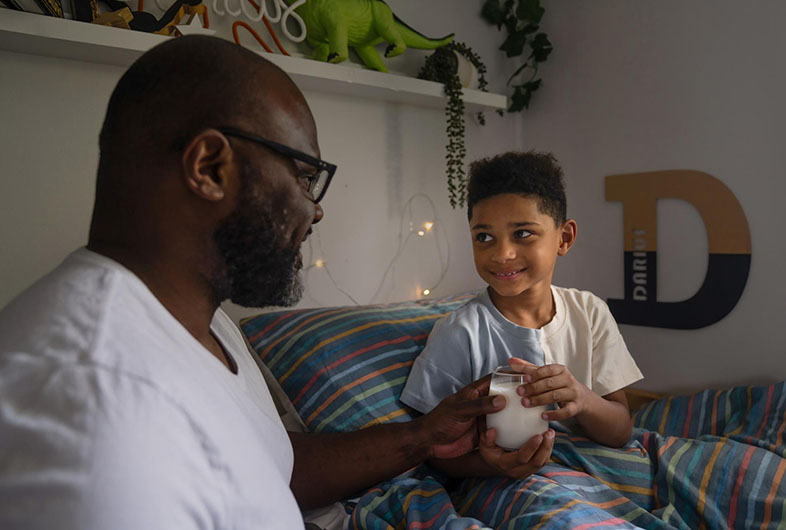If your child is having night-accidents, they’ll probably want to know why this is affecting them. Plus, they may want to know why bedwetting happens.
To make sure you’re prepared and ready to help, we spoke to author and parenting expert Liat Hughes Joshi to find out the most frequent questions children ask about this sensitive subject—and how you can reassure them with the right answers.
Kids are curious, so encourage them to ask questions
“We all know that kids are curious and inquisitive and they ask lots of questions,” says Liat.
“While it can be a trifle annoying when they ask “why” 15 times inside of a minute, it also reminds us that their brains are still growing and making sense of the world around them - and their curiosity is an aid to their development.”

Questions can also help them make sense of something in their world that’s not going quite right.
So, we expect children to ask lots of questions about difficult subjects.
It is quite normal for many children will ask a lot of questions if they have a phase of bedwetting.
If they have previously been dry at night for a while and then start to wet the bed again, they know it’s not ‘usual’ for them and may be eager to find the reasons why.
So don’t shush their questions and don’t attempt to deflect them. Make sure you read our great features on bedwetting so you can be up to speed on the reasons why children wet the bed. Then you can answer many of their questions properly, with all the facts to hand.
However, there are some aspects of bedwetting that we don’t understand, so never be afraid to tell your child if you don’t know the answer to a question.
Explain to them that nobody—not even those clever doctors—really know [all the answers] but reassure your child that, together, you will get through this phase.
Common questions kids ask about bedwetting

So, what are some of the most common questions children ask about bedwetting? Here’s a round-up of the most frequently asked things about night-time accidents.
1. “Why am I wetting the bed at night?”
When your child asks this, it’s because they want to understand what’s going on.
Your child may be feeling upset or ashamed or they may be curious and baffled by what’s going on. After all, they have managed to be dry through the night before now.
What has changed?
When talking to your child about bedwetting, be sure to listen to your child carefully and then start to ask them questions back. Did they wake up before they wet the bed? Did they have a lot to drink last night? Are they feeling well physically and are they upset or worried about anything?
This conversation will start you off on a route to helping you and your child understand the reasons for, and triggers for, this patch of bedwetting.
If they’re under the age of five, you can reassure them that it’s totally normal for children of their age to wet the bed from time to time. In fact, it’s part of a development stage.
If they are over the age of five, bedwetting is still very common. However, it’s worth speaking to a doctor about your child wetting the bed, as it is technically a medical condition at this age.
No matter their age, make sure you use language they understand and don’t ignore any questions.
Remind your child…
- it’s not their fault and they are not to blame
- they are not in trouble
- their bladder might be making too much pee for some reason
- their bladder might be a little small and able to hold less pee than other kids their age
- there may be a family trend – these things often run in families
- there may be another medical problem and if there is, you’ll sort it out together
Real parents say…
Give them their last drink at tea time, a few hours before bed.
It’s not always the answer but easy enough to try…
My son likes to climb onto my lap after dinner and have a snuggle and it’s the time he’ll ask questions about bedwetting.
He asked me the other day if people were laughing at him and it was so heartbreaking
2. “Is night-time wetting normal? Is there something wrong with me?”
“It can be heart-breaking when your child asks if they are ‘normal.’ But as we all know, when it comes to child development, there’s not really any such thing as normal anyway,” says Liat.
“Explain that while some children master potty training and night-time dryness quickly, others take a little while longer. Reassure them that they are doing fine and just need a little more help and support to get through this patch.”
Make sure to give them some facts.
Let them know that many kids grow out of wetting the bed by five or six years* but some still do so beyond that and it's very common.
Tell them that it’s not a problem at their age as they are too young to worry about it yet.
Make sure they know that you are there to support them and that they can also have the additional help of using DryNites® Pyjama Pants if they want to. Allow them to take ownership of how you all cope with bedwetting incidents such as:
- Your child can ask if they would like to change their own sheets
- Your little one can wear Pyjama Pants or use a Bed Mat if they like
- They can chat through their diet and how much they drink with you – and avoid drinking too much in the evenings
- Make sure there’s a treat for them at the end of a week, whether or not they have an accident.
Real parents say:
The only time it really bothers him is when his siblings say something, so we make sure they don't poke at him.
He does get frustrated, but I tell him that not doing anything wrong and that many kids his age still wet the bed for years to come until they just grow out of it.
That seems to comfort him.
My daughter likes to take a pile of bedding and PJs with her to her room and she says she’s going to change the sheets if she wets the bed.
She asked me if I’d like that, so I can sleep.
3. “Do any of my friends wet the bed at night?”
One way to answer this is simple:
“Did you know that many kids of your age wet the bed sometimes? Just imagine, that’s some of your friends at playgroup or nursery.”
For a child, understanding that this is a problem that affects many of their peers will be helpful.
Explain that many kids and their parents probably don’t like to talk about it but that if they did, they would find that several of their play school, nursery or school friends have the same difficulties now and again.
“Did you know that your uncle Steve still wet the bed at nine?”
Many kids like to know that adults used to be just like them, and it can help if they know a friend or family member had the same problem and got over it. [Just make sure you get their permission first.]
He might also be really helpful in having a chat with your child about how he overcame his bedwetting patch, especially as bedwetting often goes in families.
Imagine that your friend wets the bed. Does it affect your friendship with them? Your child needs to know that this is a small problem they will get over and it won’t affect the way you, or anyone else, thinks of them.
Real parents say:
Both my brothers wet the bed at night until at least nine years old (maybe a tad longer).
One brother just grew out of it and my other brother went to the chiropractor and that helped end his bed wetting.
4. “How can I stop bedwetting?”
While some children are not at all bothered by bedwetting incidents, many will be and will want to know how to stop.
If your child asks for your help with this phase, make sure you prioritise this and pay attention to what they are asking.
For example, are they asking you to help with the logistics, such as changing the bed, helping them get to the loo at night or providing Pyjama Pants? Or are they concerned about others, especially siblings, knowing?
Make sure you have chatted through all the different aspects of their disrupted nights with them, including how they feel about it and what they want as a plan of action.
Tell them you can, together:
- Make a plan of how this is going to go
- Create some nice events to inspire them
- Chat about bedtime routines, which can include food and drink and getting bedding ready
- Talk about using DryNites® Pyjama Pants and Bed Mats to help them get more precious sleep
Real parents say:
Sleep is more important and being ready rather than racing ahead!
Putting your child in night-time protection can help them a lot.
They aren’t worried about the bed getting wet and they get more sleep, so they can face the challenges better
5. “What if they don’t ask questions?”
Liat concludes: “So, you’re now primed and ready to answer your bedwetting child’s questions But—horror—what if they don’t ask any? In fact, what if they seem either completely unconcerned about it all or go to the other extreme and clam up, barely wanting to mention the subject?”
Don’t assume that because they seem happy, they are not bothered about it. Many kids put on a brave face so that they don’t upset their parents.
As above, keep the channels of communication open and try to raise the subject when you know they are happy and relaxed.
“If your child just refuses to talk about it, there may be another route. Helpful books or videos about it may help, that they can look at in private. Make as little fuss as possible and don’t try to force them to talk, as this may backfire. The last thing you want is a poor relationship with your child.”
“Think laterally—is there someone else you think they might respond better to? A grandparent, a sibling (tread carefully here) or a friend’s parent? You may notice that they have a special bond with someone, in which case you may feel you can ask that person for their help.”
Real parents say:
I did have day accidents that I was too embarrassed to acknowledge and don’t remember trying to get a better understanding by asking the adults about it.
They do not ask questions really as it’s a natural transition from nappies to big pants, the same as potty training.
This phase will pass
Both you and your child can be reassured that the phase usually passes, and your child will then be dry at night.
In the meantime, we’re here to help you and your child as much as possible, with articles on what enuresis is, to tips for sleepovers, and much more.
And remember: you are the best person to help your bedwetting child, so hang in there—you’re doing a great job!



 your parenting partner
your parenting partner